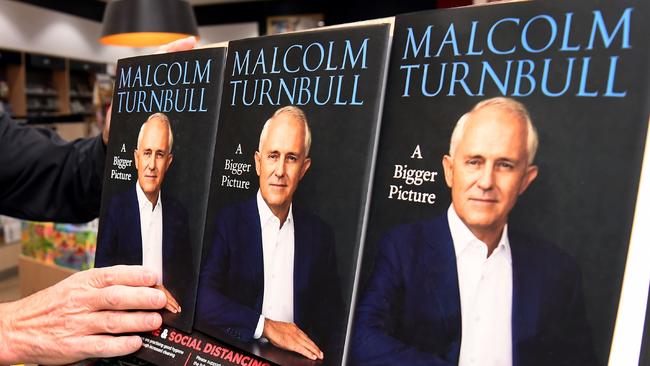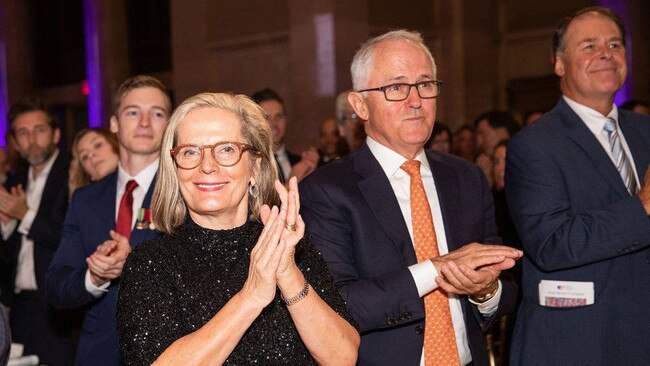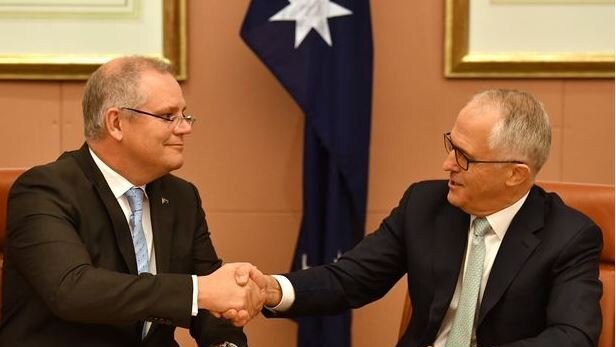Piers Akerman: Malcolm Turnbull’s book paints a sad picture
While Malcolm Turnbull’s whining autobiography is an unpleasant book to read, it does provide an insight into the recesses of the former prime minister, writes Piers Akerman.
Opinion
Don't miss out on the headlines from Opinion. Followed categories will be added to My News.
- Leftists try to paint Australia as a racist nation amid COVID-19
- ‘Victorian government failed in its witch-hunt against Cardinal George Pell’
The Bigger Picture, Malcolm Turnbull’s whining autobiographical attempt to justify the twists and turns of his political career, is an unpleasant book to read. But it does provide an insight, as self-serving as it is, into the recesses of the man.
Dr Google helpfully provides a definition of personality disorders that characterises some of the traits displayed by Mr Turnbull: “Impaired empathy and remorse, and bold, disinhibited, and egotistical traits.”
Malcolm, and yes, he was once recognised by his Christian name alone, as the Fairfax writer Elizabeth Farrelly gushed “like Beyonce”, did not become Australia’s longest-serving Prime Minister since Menzies, as she predicted in November, 2015.
He lasted just shy of three years, losing the leadership to Scott Morrison who went on to win last May’s election.
There’s no doubt he is a shrewd man, at least in business, be he was not a politician.
To lose once because of poor political decisions is not unusual but to lose twice after making the same decision – in Turnbull’s case on global warming – demonstrates his tin ear for the wider electorate.

So he lost the Opposition leadership to Tony Abbott in December, 2009, because he supported Labor Prime Minister Kevin Rudd’s embrace of the apocalyptic cult of climate change and was to later cross the floor to vote for a Labor policy which even Labor was to walk away from, and then he lost the prime ministership in August, 2018, after trying to push his colleagues into supporting the same losing policies.
MORE FROM PIERS AKERMAN:
Outbreak a chance to remake Australia’s economy
Science will beat coronavirus, not warmist alarmism
Peta Credlin, now a colleague at The Sunday Telegraph and the most insightful of political commentators, dubbed Turnbull “Mr Harbourside Mansion” in 2013 and the moniker is most apt. Had Malcolm ever strayed from the waterfront suburb and its leafy streets, had he spoken with the locals scrabbling for a living in the hamlets near his hobby farm, or had he even spent more time on the campaign trail and listened rather than waved and nodded at those whom he met, he might have escaped perdition but he was locked into an Eastern suburbs echo chamber of the wealthy but unwise for whom celebrity trumps wisdom and experience. His support in encouraging the UK’s most popular Left-wing newspaper, The Guardian, long mocked for its bigotry, to establish an Australian outlet and then to hand-pick its editorial leaders, illustrates the total absence of Liberal Party DNA in his being. But as he rather tediously writes, his ancestry included no conservatives.
As Nicholas Whitlam, one of the sons of Labor’s greatest Prime Minister, Gough Whitlam, and a former business partner of Turnbull’s wrote most tellingly in The Weekend Australian yesterday: “The truth is that he is very difficult to work with. People only find this out when they have to do so. He had four chiefs of staff as PM. Why has he lost so many supporters over the years? It’s because he lacks empathy. Some, perhaps many, of those people who have worked with him have come to dislike him.”

I have known Malcolm for many years, first as a journalist, then as a brash young solicitor through the Spycatcher case when he rubbed the nose of the British intelligence establishment in the dirt after it attempted to block publication of a former spook’s unauthorised memoir in 1987.
He and Lucy were hospitable, my wife and I were invited to his memorable fiftieth birthday party, and their daughter, Daisy, shared some of her tales of ideological torment at Sydney University with me.
My wife and I were invited to stay with the Turnbulls at their Canberra apartment when we attended a reception at the National Gallery – not knowing that he was claiming a $271-a-night living away allowance for staying in a property owned by Lucy.
Others have noted how much Malcolm has omitted from his memoir, I can add to the growing volumes of missing facts.
Malcolm actively sought my editorial endorsement when he rolled the sitting Liberal member for Wentworth, Peter King, for the candidacy in 2003, and before he rolled then Opposition leader Brendan Nelson in September, 2008, he and Christopher Pyne asked me to meet with them to discuss his prospects and the likely view of senior editorial staff at News Corp to such a move.
I was of the same view as John Howard. That Malcolm would add to the intellectual capital of the Liberal Party and could be a leader. I’ve apologised many times for this error of judgment.

But putting his many political failings aside, the character flaw I find most disturbing is his revelation that he contemplated suicide after losing the leadership to Abbott in 2009. Without conceding Abbott’s later magnificent victories which set the Liberals up in government through the Turnbull years and gave Morrison his base vote last year, Turnbull can write only – as always – about himself. He lost a political office, he had a wife, a family, millions, and at least one extremely loyal friend in Bruce McWilliam, but he fell into a depression.
I cannot but help compare his reaction to that of Cardinal George Pell. After spending more than 400 days in solitary confinement after being wrongfully imprisoned on spurious charges of child sexual abuse, the Cardinal was asked by my friend and colleague Andrew Bolt whether he had ever contemplated taking his life in the darkest hours.
Surprised by the question, the Cardinal said he was “wounded” by the ordeal but turned to his
faith to get him through.
“If you can’t pray when you’re in trouble, your faith is very weak indeed,” he said. When
questioned by Bolt on how he had survived through the ordeal, Cardinal Pell said, “because I
knew I was innocent”.
Malcolm Turnbull, once an atheist, most recently professing Roman Catholicism, has written of his despair and consequent depression. It seems a sign of extreme weakness to rely on this to get sympathy.
Perhaps writing this book will help him expel some of the demons which so patently haunt him but I suspect he has a long way to go before he can acknowledge the flaws which lie within him.
